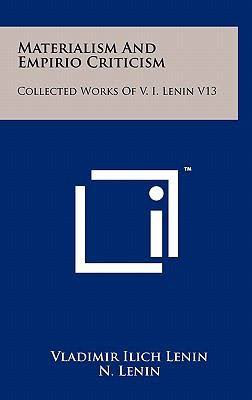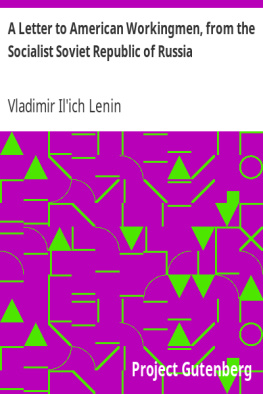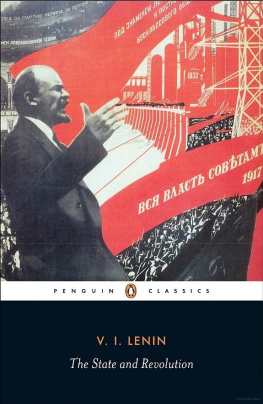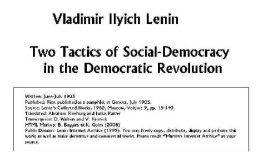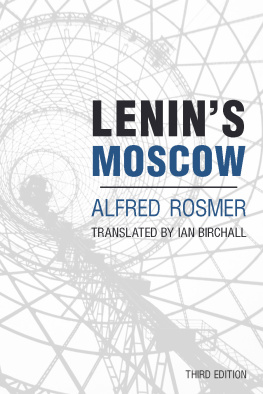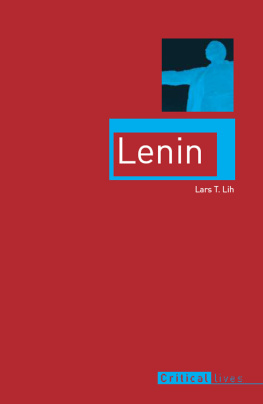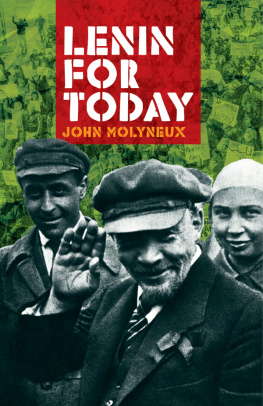Vladimir Ilich Lenin - Materialism and Empirio-criticism
Here you can read online Vladimir Ilich Lenin - Materialism and Empirio-criticism full text of the book (entire story) in english for free. Download pdf and epub, get meaning, cover and reviews about this ebook. year: 2011, publisher: Literary Licensing, genre: Science. Description of the work, (preface) as well as reviews are available. Best literature library LitArk.com created for fans of good reading and offers a wide selection of genres:
Romance novel
Science fiction
Adventure
Detective
Science
History
Home and family
Prose
Art
Politics
Computer
Non-fiction
Religion
Business
Children
Humor
Choose a favorite category and find really read worthwhile books. Enjoy immersion in the world of imagination, feel the emotions of the characters or learn something new for yourself, make an fascinating discovery.
- Book:Materialism and Empirio-criticism
- Author:
- Publisher:Literary Licensing
- Genre:
- Year:2011
- Rating:3 / 5
- Favourites:Add to favourites
- Your mark:
- 60
- 1
- 2
- 3
- 4
- 5
Materialism and Empirio-criticism: summary, description and annotation
We offer to read an annotation, description, summary or preface (depends on what the author of the book "Materialism and Empirio-criticism" wrote himself). If you haven't found the necessary information about the book — write in the comments, we will try to find it.
Materialism and Empirio-criticism — read online for free the complete book (whole text) full work
Below is the text of the book, divided by pages. System saving the place of the last page read, allows you to conveniently read the book "Materialism and Empirio-criticism" online for free, without having to search again every time where you left off. Put a bookmark, and you can go to the page where you finished reading at any time.
Font size:
Interval:
Bookmark:

A number of writers, would-be Marxists, have this year undertaken a veritable campaign against the philosophy of Marxism. In the course of less than half a year four books devoted mainly and almost exclusively to attacks on dialectical materialism have made their appearance. These include first and foremost Studies in [?it would have been more proper to say against] the Philosophy of Marxism (St. Petersburg, 1908), a symposium by Bazarov, Bogdanov, Lunacharsky, Berman, Helfond, Yushkevich and Suvorov; Yushkevichs Materialism and Critical Realism ; Bermans Dialectics in the Light of the Modern Theory of Knowledge and Valentinovs The Philosophical Constructions of Marxism.
All these people could not have been ignorant of the fact that Marx and Engels scores of times termed their philosophical views dialectical materialism. Yet all these people, who, despite the sharp divergence of their political views, are united in their hostility towards dialectical materialism, at the same time claim to be Marxists in philosophy! Engels dialectics is mysticism, says Berman. Engels views have become antiquated, remarks Bazarov casually, as though it were a self-evident fact. Materialism thus appears to be refuted by our bold warriors, who proudly allude to the modern theory of knowledge, recent philosophy (or recent positivism), the philosophy of modern natural science, or even the philosophy of natural science of the twentieth century. Supported by all these supposedly recent doctrines, our destroyers of dialectical materialism proceed fearlessly to downright fideism). Yet when it comes to an explicit definition of their attitude towards Marx and Engels, all their courage and all their respect for their own convictions at once disappear. In deeda complete renunciation of dialectical materialism, i.e., of Marxism; in wordendless subterfuges, attempts to evade the essence of the question, to cover their retreat, to put some materialist or other in place of materialism in general, and a determined refusal to make a direct analysis of the innumerable materialist declarations of Marx and Engels. This is truly mutiny on ones knees, as it was justly characterised by one Marxist. This is typical philosophical revisionism, for it was only the revisionists who gained a sad notoriety for themselves by their departure from the fundamental views of Marxism and by their fear, or inability, to settle accounts openly, explicitly, resolutely and clearly with the views they had abandoned. When orthodox Marxists had occasion to pronounce against some antiquated views of Marx (for instance, Mehring when he opposed certain historical propositions), it was always done with such precision and thoroughness that no one has ever found anything ambiguous in such literary utterances.
For the rest, there is in the Studies in the Philosophy of Marxism one phrase which resembles the truth. This is Lunacharskys phrase: Perhaps we [i.e., all the collaborators of the Studies evidently] have gone astray, but we are seeking (p. 161). That the first half of this phrase contains an absolute and the second a relative truth, I shall endeavour to demonstrate circumstantially in the present book. At the moment I would only remark that if our philosophers had spoken not in the name of Marxism but in the name of a few seeking Marxists, they would have shown more respect for themselves and for Marxism.
As for myself, I too am a seeker in philosophy. Namely, the task I have set myself in these comments is to find out what was the stumbling block to these people who under the guise of Marxism are offering something incredibly muddled, confused and reactionary.
Vladimir Lenin. September 1908.
Fideism is a doctrine which substitutes faith for knowledge, or which generally attaches significance to faith. Lenin
Interpolations in square brackets (within passages quoted by Lenin) have been introduced by Lenin, unless otherwise indicated.Ed.
V. I. Lenin in a letter to A. I, Ulyanova-Yelizarova, dated October 20 (November 8), 1908, wrote: ...if considerations due to the censorship prove very severe, the word clericalism could be replaced everywhere by the word fideism with an explanatory note (fideism is a doctrine which substitutes faith for knowledge, or which generally attaches significance to faith). This is in case of needto explain the nature of the concessions which I am ready to make. (see Collected Works, present edition, Vol. 37, p. 395). In another letter to his sister, Lenin proposed replacing the word clericalism by the word Shamanism, to which she answered. It is already too late for Shamanism. And is it really better? (Ibid., p. 662). From the text of the book Materialism and Empirio-criticism it can be seen that the word fideism was substituted for clericalism, although the latter word remained unaltered in some places. The note suggested by Lenin was given in the first edition of the book and was retained in subsequent editions.
Lenin is referring to a religious-philosophical tendency hostile to Marxism called god-building, which arose in the period of reaction among a section of the party intellectuals who had deserted Marxism after the defeat of the revolution of 190507. The god-builders (A. V. Lunacharsky, V.Bazarov and others) preached the creation of a new socialist religion in an attempt toreconcile Marxism with religion. At one time A. M. Gorky supported them.
An enlarged meeting of the editorial board of Proletary (1909) condemned god-building and stated in a special resolution that the Bolshevik group has nothing in common with such a distortion of scientific socialism. The reactionary nature of god-building was exposed by Lenin in his work Materialism and Empirio-criticism an din his letters to Gorky of February-April 1908 and November-December 1913.
With the exception of a few corrections in the text, the present edition does not differ from the previous one. I hope that, irrespective of the dispute with the Russian Machians, it will prove useful as an aid to an acquaintance with the philosophy of Marxism, dialectical materialism, as well as with the philosophical conclusions from the recent discoveries in natural science. As for A. A. Bogdanovs latest works, which I have had no opportunity to examine, the appended article by Comrade V. I. Nevsky gives the necessary information. A. A. Bogdanov is imparting bourgeois and reactionary views.
Vladimir Lenin. 2nd September, 1920.
V. I. Nevskys article Dialectical Materialism and the Philosophy of Dead Reaction was published in 1920 as an appendix to the second edition of the book Materialism and Empirio-criticism.
A. Bogdanov put forward the idea of proletarian culture as early as 1909, by which he meant that the proletariat should elaborate its own culture in contradistinction to that of the past.
After the October Socialist Revolution Bogdanov and his fellow-thinkers adopted the so-called proletarian cultrual-educational organisations (Proletcult) as the field of their activities. With the aid of this convenient rostrum, they began actively to propagade anti-Marxist views, virtually denied the importance of the cultrual inheritance of the past, and endeavoured by laboratory methods divorced from life to create a culture for the proletariat, counterposing the latter to the rest of the working people and above all to the peasantry.
Font size:
Interval:
Bookmark:
Similar books «Materialism and Empirio-criticism»
Look at similar books to Materialism and Empirio-criticism. We have selected literature similar in name and meaning in the hope of providing readers with more options to find new, interesting, not yet read works.
Discussion, reviews of the book Materialism and Empirio-criticism and just readers' own opinions. Leave your comments, write what you think about the work, its meaning or the main characters. Specify what exactly you liked and what you didn't like, and why you think so.

